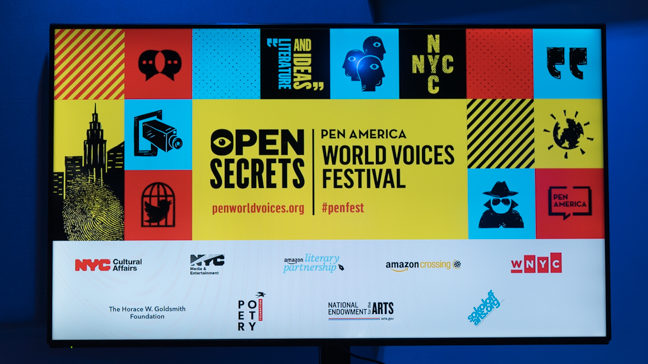Every year PEN America presents its World Voices Festival, a literary festival in New York City featuring at least 200 writers and artists from over fifty countries in conversation about some of the most important literary, cultural, and political topics of our age. This year the event spanned six days, from May 6th to May 12th, and Guernica writers were able to attend four of the events. These are their dispatches from the festival.
On May 11th, at the PEN America World Voices Panel panel “Love in the Time of War: A Celebration of Yusef Komunyakaa,” poet Toi Derricotte asked a packed audience at the Lillian Vernon Creative Writers House in Greenwich Village to take some time to think about spaces where we had reimagined ourselves. After a moment, she asked everyone to share that space out loud, whether to the room or a neighbor. The collective response was a shy, half-whispered clamor of times and places—churches, libraries, organizations like Brooklyn’s Cave Canem—that rose to a swell of laughter in which no single answer took priority. “Man, that is so cool!” Derricotte exclaimed. “Wow, I love that!”
Derricotte was joined by fellow poets Maurice Emerson Decaul (who also moderated), Tyehimba Jess, Kevin Young, and Javier Zamora to celebrate Yusef Komunyakaa, a writer who has spent much of his decades-long career considering how we imagine and reimagine ourselves—whether it happens through sublime self-actualization or because of painful coercion. Young, the current poetry editor at The New Yorker, discussed Komunyakaa’s influence on his own Black Maria, a collection of film noir poems featuring a bruised and Komunyakaa-esque narrator (“All’s I got left [is] one lousy alias: S.O.S. Malone. My real name’s A.K.A. Jones. Leastwise, that’s what I’ve been told.”) When he read Komunyakaa’s “Unnatural State of the Unicorn,” which considers the contradictions between the poet’s artistic success and his experiences with racism and as a veteran, Young interrupted himself to repeat two lines—“I’ve done it all / to be known as myself—his voice breathless and shaking.
The event centered heavily on Komunyakaa’s service in Vietnam and the themes of domestic and foreign conflict that he returns to across several collections, particularly Dien Cai Dau and Neon Vernacular. “He so vividly introduces a new generation to the complexities and the weight of war,” Jess said, reflecting on how fewer and fewer of his students can remember a time when the US was not engaged in conflict or occupation. “I can’t imagine talking about the Vietnam War without his work.” When Zamora introduced “Facing It,” Komunyakaa’s famous account of visiting the Vietnam Veterans Memorial in Washington, DC, some audience members gasped softly in recognition and anticipation.
Derricotte read “Camouflaging the Chimera,” an account of a military ambush written entirely in the first-person plural, and urged the audience to pay careful attention to the use of “we.” “Perhaps the speaker in the poem…is in denial, out of touch with his sense of personal responsibility,” she said. “Or perhaps the ‘we’ in the poem becomes all of us. None of us can claim innocence for what is being done in the world” (Young added that the “we” is “generous and Whitmanesque”). After drawing attention to Komunyakaa’s ambivalence as a black soldier and his other writings on American white supremacy generally, Derricotte said of her own childhood, “We always knew we were in a conflict. I was aware all the time that I was in a situation that might detonate. It was a physical way you held your body, the way your brain grew…That internal understanding of living in conflict all the time is something that is an internal understanding of war.”
But throughout the event, Decaul and the other guests took care to call special attention to moments of compassion and tenderness that always appear alongside the suffering and grief in Komunyakaa’s work. “We Never Know,” from Neon Vernacular—which was read twice, first by Jess and later again by Decaul—opens with a man gunned down, “danc[ing] with tall grass / for a moment, like he was swaying / with a woman.” When the poem’s narrator approaches the body, he confesses, “There’s no other way / to say this: I fell in love” before turning the corpse onto its back “so he wouldn’t be / kissing the ground.” Young also read “Ode to the Maggot,” which concludes: “Little / Master of earth, no one gets to heaven / Without going through you first.”
Zamora, a former student of Komunyakaa’s, mentioned often that the poet was a uniquely compassionate mentor, “generous to students and to poetry.” Discussing one of his own poems, in which he eulogizes the man who protected him during a border crossing that turned violent upon the arrival of US Border Patrol, Zamora said, “He made me feel comfortable and secure enough to share very personal stuff. That is very hard to do as a teacher, when you are dealing with a student who has gone through trauma. But I already knew going into the room that I could do that, because of what he has produced.”
Read more from the PEN World Voices Festival here:
Two “Artists of the Air” on the Limits of Time and Space by Alan Scherstuhl
Six Writers on the Power of Telling the Truth by Fran Bigman
